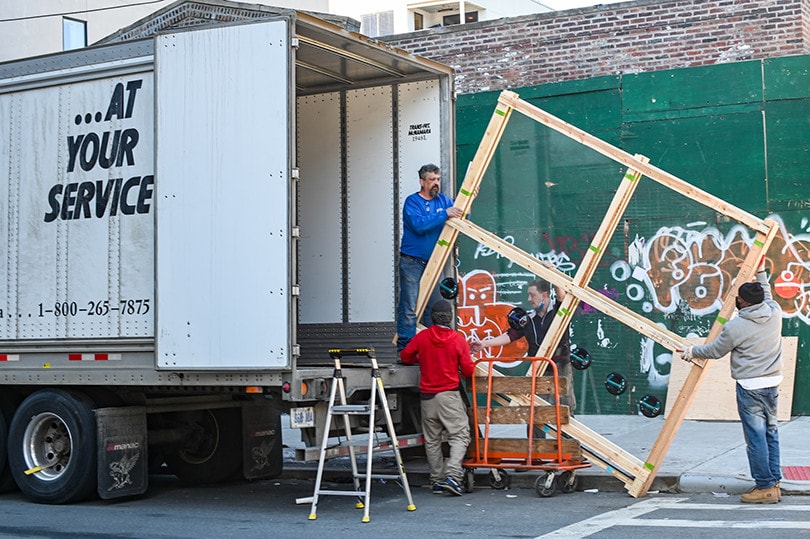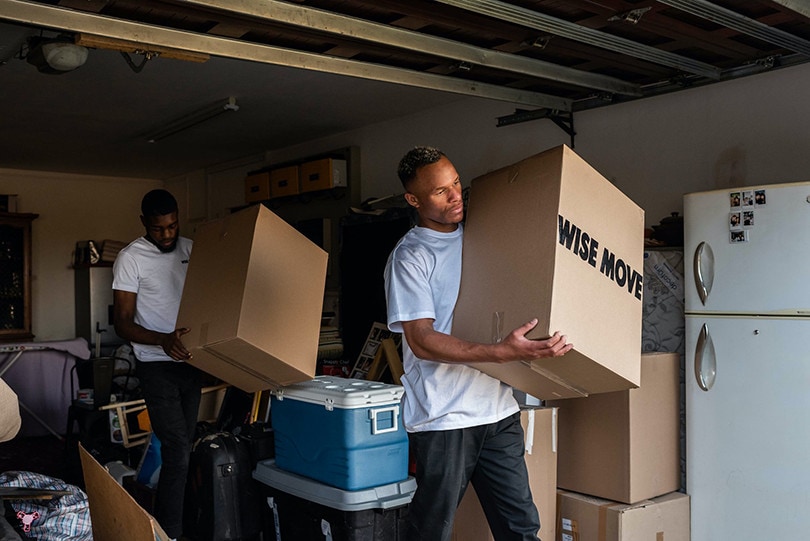How Much Do Movers Cost? (Updated in 2025)
-
Pete Ortiz
- Last updated:

Moving can be exciting and moving can also be stressful. People move for all sorts of reasons, including new jobs, education, and even love. But moving can also be painfully expensive. If you have a lot of stuff and you have never considered the price of a move, you could be in for a rude awakening. If you are planning on using movers to get your stuff from point A to point B, it is going to cost you, especially if you plan on having the movers pack up your things as well. The cost to move an apartment locally can be as low as $300, while moving a large family across the country can cost upwards of $15,000
Moving locally is still fairly affordable, but long-haul moving has gotten extremely expensive, likely due to the rising cost of labor and fuel. Here is how much movers cost this year, including hidden fees, average labor costs, and pricing factors to be aware of.
Cost of Movers

The cost of moving can vary depending on the size of the home, the distance that needs to be traveled, and the amount of stuff being shipped. Generally speaking, the more stuff that needs to go and the farther it needs to travel, the more expensive the costs are going to be.
Local deliveries get a big discount over long haul deliveries. Moves that are traveling less than 100 miles are often much cheaper than moves going over 100 miles.
The cost of packing is also substantial. You can get jobs quoted where the movers pack and move your things or if they simply need to load your things. Some people prefer to pack their own items, so they know where everything is, while other people like the convenience of a full-service job.
Cost of Moving Without Packing
| Distance | Apartment / 1 Bedroom | 2-3 Bedrooms | 4+ Bedrooms |
| Local | $250 – $500 | $300 – $800 | $700 – $1,500+ |
| 100+ Miles | $700 – $3,000 | $2,000 – $8,000 | $4,000 – $10,000+ |
Full-service moves are much more expensive than moves that just require transportation. The most expensive moves are full-service moves that need to travel cross country in order to reach their destination. A large house getting packed up and moved thousands of miles can easily cost $15,000 or more. Again, as we saw with the costs without packing, full-service moves get a sizable discount for staying local rather than having to go long distances.

Cost of a Full-Service Move
| Distance | Apartment / 1 Bedroom | 2-3 Bedrooms | 4+ Bedrooms |
| Local | $500 – $1,000 | $800 – $2,000 | $1,500 – $4,000 |
| 100+ Miles | $1,000 – $3,500 | $2,500 – $8,000 | $5,000 – $15,000 |
The size of the home also plays a big role in the final cost. The more rooms there are, the more movers a company needs to send to get the truck packed and loaded. Larger houses require more man hours and more laborers who can cost a lot more than a smaller job. This shows a breakdown of how many laborers are typically required for certain size houses and their cost per hour. Large houses can quickly run up the costs just in labor.
Cost of Movers Per Hour
| Size | # of Movers | Cost / Hour | # of Hours |
| 1 Bedroom | 2 | $95/hr | 4 hours |
| 2 Bedroom | 3 | $125/hr | 6 hours |
| 3 Bedroom | 3-4 | $150/hr | 8 hours |
| 4 Bedroom | 4 | $150/hr | 10 hours |
| 5 Bedroom | 5+ | $200/hr | 12 hours |
The cost of moving varies depending on the size of the move, the amount of stuff going and the distance of the move. The national average cost for a local full-service move is $2,500. The average cost of a full-service long-haul move is $9,000. You can save money by packing your things yourself, but you will have to pay for packing materials and take the time to get everything ready before the movers arrive. If you are not doing full-service moving, you will have a list of requirements to meet before the movers show up on your property.
 Additional Costs
Additional Costs

Fragile or Large Items
- $100 – $400
Large, heavy, exotic, or fragile items will often include an additional fee to have them moved. These types of items can include pool tables, statues, glass tables, pianos, delicate artwork, and oversized wood furniture. Movers will charge extra because these items will need special packaging, extra people to help move them, and special attention.
Packing Supplies
- $50 – $500
Even if your moving company includes packing and materials in their quote, there is a good chance you are going to want to have extra materials on hand just in case. Many people like to pack sensitive items themselves, and some people like to pack a vehicle they take with them on the move in case anything delays the bulk of their things. Even a little packing on the side will require some materials, not to mention if you need to pack the whole house yourself.
Stair Fees
- $50 – $75 per flight
Many movers often account for one flight of steps when moving. This will cover a second floor apartment or a simple two story home. However, if the movers have to go up more than a single flight of steps to reach your belongings, it could incur an additional charge. Stair fees can run anywhere from $50 to $100 per flight of steps beyond one. That means if you need to have them carry your things down six flights of steps from a third floor apartment, you could be looking at $300 to $600 in additional charges.
Elevator Fees
- $25 – $100 per ride
Elevators are easier than stairs, so they should be free. Right? Wrong. Elevators also incur additional charges. Getting furniture into an elevator can be extremely difficult and cumbersome. Elevators are also often slow and get congested easily. Some buildings require you to schedule your move within a window so your movers can use the elevator uninhibited. All of this hassle comes with additional costs. Some movers charge a flat rate to get your things into a freight elevator, while others could charge a rate per ride they have to make on the elevator with boxes.

Long Carry Fees
- $50 – $125
Another common fee that comes up with movers is a long carry fee. This happens when a moving truck cannot fit close to the dwelling and requires the movers to walk a long distance. This typically happens in crowded neighborhoods or apartments with parking lots that a semi-truck cannot safely fit into. Most movers cover the first 50 feet from the truck to the door, and after that, additional fees start to kick in.
Storage or Overnight Fees
- Variable
Another thing that might appear on your bill is storage or overnight fees. Some companies will charge you to hold your things if you have a gap in your move. Say, for example, you move out on a Friday but can’t move in until the following Tuesday. The movers can store your things in the trailer until then, but it is going to cost an additional fee. Overnight fees are similar. If your trip requires multiple overnight stops to complete, you could see extra charges for the drivers over the long haul. The exact costs, and if you see these costs at all, will depend on your moving company and the details of your contract. Sometimes these things are included in the initial estimate, and sometimes, they are not.
Tipping/Gratuity
- 10% – 20% extra
Movers get extra sustenance from tips. Moving is a hard job, and people who sweat all day wrestling your grandma’s antique wardrobe up and down three flights of stairs will appreciate a little bit extra at the end of the day. Tipping is rarely required, but it is a nice gesture. Some people will opt to tip out a small amount, while other people might opt to give a few hundred dollars to show their appreciation. The difficulty of the job, the number of people involved, and the time of year can also play a role. Movers who whisk a dolly away over icy sidewalks might deserve more than one that gets to move on a beautiful sunny autumn day.
 Factors That Influence the Cost of Your Move
Factors That Influence the Cost of Your Move

Time of Year
Spring and summer are the busiest seasons for movers. Spring sees colleges let out, and new graduates start moving to new cities to start their careers. Summer sees an influx of movers due to school being out and due to the fact that the greatest number of homes are sold in the spring and summer. Fall and winter are less busy, which means they are cheaper to move during. Few people want to haul furniture around in the biting cold or the wet snow. Planning a move for fall or winter can save you money, while moving during early summer can jump your costs considerably.
Total Distance
One of the biggest factors that can affect the price of your move is the distance. A cross-country move is always going to cost a lot more than an instate move. The longer the distances, the more gas that the trucks need to use, and more stops need to be made. That all adds a lot to the bottom line. Long haul drivers also often get paid more than regional drivers. Crossing state lines could result in inspections, taxes, and tickets at checkpoints along the way. If you are planning a long move many states away, you need to start budgeting for a larger moving bill.
Amount of Stuff
You can move a small amount of stuff long distances for cheap. The more stuff you add, the more money it will cost. More stuff means bigger trucks. Bigger trucks mean more gas. Bigger trucks also mean more people. A single mover isn’t going to move thousands of pounds of stuff on their own. Large houses are going to require a crew of movers to do the job properly.
If you are worried about the amount of stuff you have, consider donating some of the unwanted items before the move. Get rid of old furniture. Have a garage sale. Throw away worn out things that need to be replaced. Paying to move old items can become more expensive than simply replacing them, depending on how much weight you add to the truck.
Moving Date
The exact moving date itself can also affect the final price of your move. Moving in the middle of the week and the middle of the month will be a lot cheaper than moving on a Friday at the end of the month. The busiest time for movers is at the end of the month when leases usually run out, at the end of the work week when people do not need to take time off, and at the end of a school semester when parents and students want to move before the next term starts. Avoiding those dates can help reduce your moving costs considerably because of lower demand.
Conclusion
Moving is a big life event and it can come with a lot of hidden fees. The cost of moving can quickly balloon due to a number of factors. If you are not prepared the final bill could cause a considerable amount of sticker shock. Evaluate how much stuff you have, how far you are moving, and whether you need to have a full-service move so that you can get an accurate estimate for your plans.
Featured Image Credit: LightField Studios, Shutterstock
Contents


